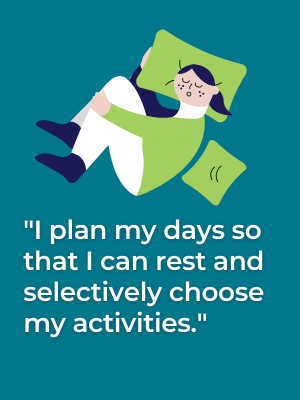
Published on February 22, 2022 | In living with PKD, a healthy diet and regular exercise are important aspects in managing PKD. But there’s one factor that can make daily life challenging—fatigue. That overwhelming feeling of exhaustion can be frustrating and affects everyone differently. Today, Lara Macklin is sharing how she manages PKD and fatigue.
Can you tell us a little bit about your PKD journey?
Lara: Short version—I was diagnosed in my 20s and it started to affect me more in my 40s. I’ve always dealt with blood pressure issues, but nothing too much more than that until I was in my 40s. Although, the anxiety and stress of not knowing what was next were almost worse. Then I developed a large cyst on my liver that caused a lot of discomfort and eating issues with reflux and slight nausea. Between the size of my kidneys and the liver cysts it was frustrating, anxiety and stress built up. Yet, my kidney function remained good enough. I had the large cyst drained and that helped but it filled back up over about a year’s time. This past August, my GFR dropped to 19 and I could start the transplant process. I am now waiting while 3 people are going through the Living Donor Process to see if they are a match.
What does your fatigue look like?
Lara: Mostly just tired, no energy. I have about 3-4 good hours in me a day before I feel it setting in and it depends on what I’m doing. I want to lay down and be horizontal or stand up. Sitting is hard. Even eating a small meal makes it hard to sit, so I need to walk or lay down. Walking can be exhausting at the end of the day, so I end up laying down. I am constantly fighting the right thing to do and what I feel like doing. I’m still working full time, mostly remote, but when I do go in I am on my feet all day and just collapse when I get home. When I work from home, I often try and take a break in the middle of the day for a walk and a rest, sometimes a nap.
How does it affect you?
Lara: It changes the way I want to live my life and be active with my family and pup. My days are now scheduled around how I feel and not what I want to do.
When did you start noticing the fatigue?
Lara: I had a non-related PKD issue and became severely anemic. That was when it really hit me. But I would say when my GFR was in the low 20s and during all the anemia issues I started noticing it. It took almost three months to get my red blood cell count back up to normal.
How do you manage your fatigue?
Lara: I plan my days so that I can rest and selectively choose my activities. Plenty of sleep too.
Anything else you’d like to share?
Lara: This is just part of the disease and accepting that may help, instead of trying to be sad or depressed about it. It also helps when family and friends understand how real fatigue can be. It took me a long time to stop feeling sorry for myself and learn to live with my new “normal”. My friends who have received transplants say I will be amazed at how much energy I will have after the transplant. Can’t wait! But that comes with the price of having a compromised immune system for the rest of my life…
For resources on living with PKD, check out PKD Connect. Here you’ll find education and tools to help you at any stage of your PKD journey. PKD Life is also a great spot for useful tips on managing PKD. Take a look at these articles on sleep strategies and weighted blankets to help you feel nice and rested.










Lara, thank you so much for sharing your story with us. I know exactly what you’re going through. It is frustrating being so limited, and having a small “window” of time in a day where you really feel good and can accomplish things. I hope one of your potential donors is approved!!!
Lara,
I hope that one of your donors is a good match for you and that the transplant happens soon. It sounds like you are really suffering. I screened my son’s potential donors for blood type before giving them to our transplant center because they were slow and would only consider two people at a time. That helped us to weed them out a bit.
The fatigue of the anemia of chronic kidney disease is real. Towards the end, when my GFR had fallen like yours, I was able to use injectable epoetin. It made a huge difference. You’ll need to ask your doctor about whether that’s an option for you.
My son and I both have transplants. You will feel so much better on the other side. I’m 16 years out, he’s 3. You’ll get through this.
Thank you for sharing. I am just beginning to learn about this disease after my boyfriend was recently hospitalized. Reading your story of fatigue answered a question of mine!
I hope your donor is a match!
Sincerely
Thank you
Thank you for sharing. I have been dealing with this disease for 29 years and as I am only 38 I thought I was loosing my mind I am always so exhausted and tired with no energy to do simple tasks I feel like a bad mom or a bad wife because it’s hard for me to even do small cleaning tasks some days I went from constantly go go go to now just sit sit sit or sleep. I want to know what your suggestion would before boosting energy in a safe way because working 50hr weeks and having a husband and 8year old is exhausting every ounce of energy I can muster
Thanks so much for sharing your story Lara – I also have pkd with a gfr in the mid twenties and no one has spoken to me about the extreme fatigue so I’ve been labelling myself as unproductive and lazy which is really unkind to myself and unfair! Thanks for sharing your story – will go for a checkup soon! So value reading this.
Hi I’m 65 down to 9gfr and my fatigue is demoralizing for how active I was before. I work full time. I had to go off the active transplant list because I got Breast cancer. My 2 years wait is up next month I go in March for a transplant physical. My daughter is going to try and donate a kidney. Its been a long 2 years. I did a high energy dance class until may of 23 and had to quit. My energy went fast. I just started getting a shot for my anemia. I do not want to go on dialysis. I’m hoping i feel good enough until transplant
I’m in the faction of folks who are very symptomatic earlier— stage 3. Severe fatigue, pain, nausea. It’s important to remember that the trajectory varies for individuals greatly. I found this study helpful snd shared it with my docs who appreciated it: https://academic.oup.com/ckj/article/8/5/531/471837
I am a 64 yr old man with stage 3b kidney failure. my fatigue is pretty much taking over my life. I work and yawn all day long. It can sometimes be embarrassing . My family doesnt understand why I yawn so much . I try and explain but falls on deaf ears .
Reading this short article made such a huge difference for me today. And I really appreciated the comments about how the fatigue impact people self-worth. I was just telling my daughter today that I feel like such a loser because I do absolutely nothing besides work. It was so helpful to hear that it’s not just me and that I’m not just a bad, broken person.